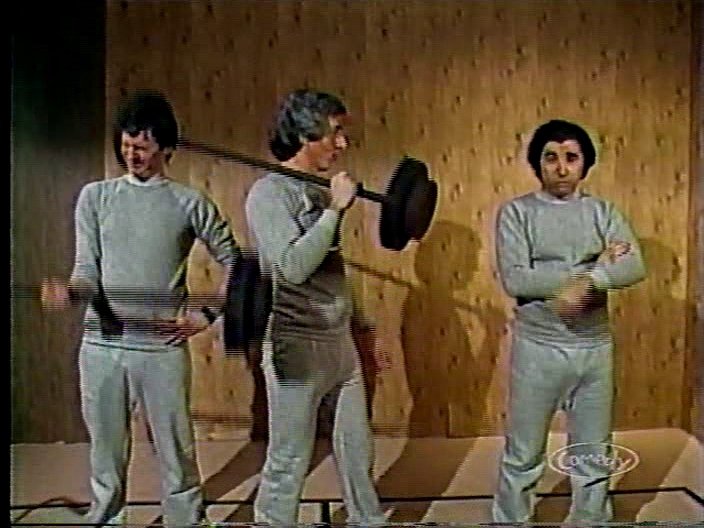
Existentialist Weightlifting
Classic SNL Review: May 5, 1984: Barry Bostwick / Spinal Tap (S09E18)
Sketches include "Simulated Cat Fight", "Lie Detector", "Iceman", "2 On the Town", "Spinal Tap Interview", "The Turkey Lady", "La Cage aux Folles", "Unanswered Questions of the Universe", and "Dog Day P.M." Spinal Tap performs "Christmas With The Devil" and "Big Bottom". Comedian A. Whitney Brown also appears.
Classic SNL Review: March 17, 1984: Billy Crystal / Al Jarreau (S09E15)
Sketches include "St. Patrick's Day Wrap-Up", "Hung Like Me", "Winston University", "Family in the Attic", "Sammy & Reagan", "Unanswered Questions of the Universe", "Bad Career Moves", "God's Place", "The Womb", and "The First Show". Al Jarreau performs "Mornin'" and "Trouble In Paradise".
Classic SNL Review: November 5, 1983: Betty Thomas / Stray Cats (S09E04)
Sketches include: "Astronaut", "Memorex", "James Brown's Celebrity Hot Tub Party", "Curly Audition", "Special Report", "Unanswered Questions", "You Win A Dollar", "Perfectly Frank", "Swan Break", "Jane Fonda", "The Gumby Story", "Crisis '83 Update" and "Misfits". Stray Cats perform "(She's) Sexy + 17" and "I Won't Stand In Your Way".
Classic SNL Review: October 15, 1983: Danny DeVito & Rhea Perlman / Eddy Grant (S09E02)
Sketches include "Calvin Klein Cream Pies", "Mister Robinson's Neighborhood", "Crazy Edelman", "What Would Frank Do?", "Small World", "Mom Was Right", "Spanish Class", "Autograph Hounds", "Book Beat", "The Amos 'N Andy Show", "Masterpiece Humor", and "Body Guard". Eddy Grant performs "I Don't Wanna Dance", "Electric Avenue" and "Living On The Frontline".
Classic SNL Review: October 8, 1983: Brandon Tartikoff / John Cougar (S09E01)
Sketches include "Brandon's Office", "Calvin Klein Cream Pies", "James Watt", "Jazz Riffs", "Feln's Discount Food & Clothing Warehouse", "Show Ideas", "Gumby & Pokey", "Man On The Street", "Larry's Corner", "Rent-A-Gun", "NBC: Be There", and "Terrible Day". John Cougar performs "Pink Houses" and "Crumblin' Down". Gene Siskel and Roger Ebert review tonight's show in progress.
SNL Up Close: 1982-83
Dick Ebersol brought Saturday Night Live back from the brink of cancellation.His first full season of SNL had its share of volatility, particularly with Michael O'Donoghue's mid-season firing, but the show stablized by the end of the season.For the next season, Ebersol and producer Bob Tischler retreated a bit from the calculated risks the show took in 1981-82: Don Pardo was back in the announcer's booth, the "live from New York" phrase opened some (but not all) of the shows this year, and hosts once again got monologue segments following the opening montage. Like with 1980-81, and 1981-82, I will be doing sketch-by-sketch reviews of the episodes this season.If anyone has information to contribute about the episodes, such as who wrote what, writer cameos, etc., I welcome it and will acknowledge my source in the sketch review.




